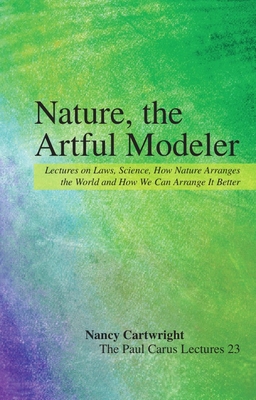Nature, the Artful Modeler: Lectures on Laws, Science, How Nature Arranges the World and How We Can Arrange It Better

Nature, the Artful Modeler: Lectures on Laws, Science, How Nature Arranges the World and How We Can Arrange It Better
How fixed are the happenings in Nature and how are they fixed? These lectures address what our scientific successes at predicting and manipulating the world around us suggest in answer. One--very orthodox--account teaches that the sciences offer general truths that we combine with local facts to derive our expectations about what will happen, either naturally or when we build a device to design, be it a laser, a washing machine, an anti-malarial bed net, or an auction for the airwaves. In these three 2017 Carus Lectures Nancy Cartwright offers a different picture, one in which neither we, nor Nature, have such nice rules to go by. Getting real predictions about real happenings is an engineering enterprise that makes clever use of a great variety of different kinds of knowledge, with few real derivations in sight anywhere. It takes artful modeling. Orthodoxy would have it that how we do it is not reflective of how Nature does it. It is, rather, a consequence of human epistemic limitations. That, Cartwright argues, is to put our reasoning just back to front. We should read our image of what Nature is like from the way our sciences work when they work best in getting us around in it, non plump for a pre-set image of how Nature must work to derive what an ideal science, freed of human failings, would be like. Putting the order of inference right way around implies that like us, Nature too is an artful modeler. Lecture 1 is an exercise in description. It is a study of the practices of science when the sciences intersect with the world and, then, of what that world is most likely like given the successes of these practices. Millikan's famous oil drop experiment, and the range of knowledge pieced together to make it work, are used to illustrate that events in the world do not occur in patterns that can be properly described in so-called laws of nature. Nevertheless, they yield to artful modeling. Without a huge leap of faith, that, it seems, is the most we can assume about the happenings in Nature. Lecture 2 is an exercise in metaphysics. How could the arrangements of happenings come to be that way? In answer, Cartwright urges an ontology in which powers act together in different ways depending on the arrangements they find themselves in to produce what happens. It is a metaphysics in which possibilia are real because powers and arrangement are permissive--they constrain but often do not dictate outcomes (as we see in contemporary quantum t
PRP: 154.69 Lei
Acesta este Prețul Recomandat de Producător. Prețul de vânzare al produsului este afișat mai jos.
139.22Lei
139.22Lei
154.69 LeiLivrare in 2-4 saptamani
Descrierea produsului
How fixed are the happenings in Nature and how are they fixed? These lectures address what our scientific successes at predicting and manipulating the world around us suggest in answer. One--very orthodox--account teaches that the sciences offer general truths that we combine with local facts to derive our expectations about what will happen, either naturally or when we build a device to design, be it a laser, a washing machine, an anti-malarial bed net, or an auction for the airwaves. In these three 2017 Carus Lectures Nancy Cartwright offers a different picture, one in which neither we, nor Nature, have such nice rules to go by. Getting real predictions about real happenings is an engineering enterprise that makes clever use of a great variety of different kinds of knowledge, with few real derivations in sight anywhere. It takes artful modeling. Orthodoxy would have it that how we do it is not reflective of how Nature does it. It is, rather, a consequence of human epistemic limitations. That, Cartwright argues, is to put our reasoning just back to front. We should read our image of what Nature is like from the way our sciences work when they work best in getting us around in it, non plump for a pre-set image of how Nature must work to derive what an ideal science, freed of human failings, would be like. Putting the order of inference right way around implies that like us, Nature too is an artful modeler. Lecture 1 is an exercise in description. It is a study of the practices of science when the sciences intersect with the world and, then, of what that world is most likely like given the successes of these practices. Millikan's famous oil drop experiment, and the range of knowledge pieced together to make it work, are used to illustrate that events in the world do not occur in patterns that can be properly described in so-called laws of nature. Nevertheless, they yield to artful modeling. Without a huge leap of faith, that, it seems, is the most we can assume about the happenings in Nature. Lecture 2 is an exercise in metaphysics. How could the arrangements of happenings come to be that way? In answer, Cartwright urges an ontology in which powers act together in different ways depending on the arrangements they find themselves in to produce what happens. It is a metaphysics in which possibilia are real because powers and arrangement are permissive--they constrain but often do not dictate outcomes (as we see in contemporary quantum t
Detaliile produsului










